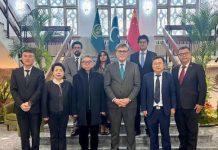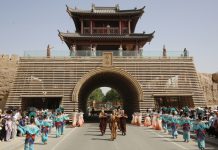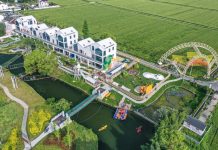Liangshan: A Sunday in early fall is a good time for those living in the Mu’endi community to enjoy their new life after their busy relocation here recently. At the Central Square, the community elders can be seen chatting and laughing in the warm sun. Young women sit on the lush green lawns, keeping an eye on their toddlers while embellishing their homemade clothes with the unique embroidery of their community. The only store in the community bustles with boisterous children scrambling to buy lollipops. Mu’endi is a newly built relocation community in Zhaojue, a county in Liangshan Yi Autonomous Prefecture, Sichuan Province in southwest China. Over 6,000 people who once lived in extreme poverty in deep mountains have been re-billeted here. The relocation is part of the targeted poverty alleviation initiative that started in 2013 to help those living below the national poverty line, equivalent to about 3,218 yuan ($475) annual per-capita income as of the end of 2019, pursue moderate prosperity. Villagers left their dilapidated mud houses in the mountains to move into the new apartments in Mu’endi, paying only a token sum of money. The rest of the cost has been borne by the government.
Liangshan has historically been one of the poorest regions in China. But with the implementation of the targeted poverty alleviation policy, it has made progress by improving housing and transportation and finding jobs for residents to achieve sustainable growth, so that they will not remain dependent on government handouts. The drive has revitalized rural Liangshan.
Living on the cliff edge
Mouse Labo is one of the relocatees. The 26-year-old moved into his new apartment in Mu’endi with his wife and three children four months ago. “My new home is large, bright and was furnished by the community before I moved in. We spent only 10,000 yuan ($1,474) on it,” he told Beijing Review. “If I had to buy it on my own, I may not be able to afford it even after saving for the rest of my life.”
– The Daily Mail-Beijing Review News exchange item
The market value of the new apartment is estimated to be about 300,000 yuan ($44,000). Mouse Labo is the sole wage earner in his family and his earnings were erratic in the past.
Life in Mu’endi is convenient for it has amenities such as shops, a recreation center for the elderly, and community reading rooms for children. Moreover, a primary and middle school and a hospital are under construction, so are factories and agricultural parks that will provide jobs.
For Mouse Labo, one of the biggest benefits is that his children can now have quality education, which motivated him to move down here from his old village Atulieer. “The living expenses in the community are bound to be higher than those in the village. That’s why I and some other villagers at first hesitated to move in here,” he said. Besides, in the old village, they could grow corn, potato and other vegetables to feed themselves. “In the past, many villagers did not like to relocate,” he said. “Now people’s mindset has changed.”
Besides being a devoted son, husband, and father, Mouse Labo is also an Internet celebrity, with nearly 100,000 followers on Douyin, the Chinese version of short video platform TikTok.
He became the cynosure of all eyes with a special skill—free climbing, which he acquired in the old village. It’s no mere hobby or adventure sport but an essential skill for those living in Atulieer, an isolated village surrounded by steep mountains.
For the over 300 villagers living there, the only way to get out of the village was by climbing down a wood and vine ladder hanging on the almost vertical cliff, which led to the village being dubbed the cliff village. Even children needed to acquire free climbing skills to go down to school. Mouse Labo started climbing down and up when he was just 4 years old.
Why there is no paved road to this village? China has become renowned globally for its infrastructure building capability, the Belt and Road Initiative being a prime example of it. The complicated geology is the main reason. Jise Fangsen, deputy head of Zhaojue, the county where Atulieer is located, attributed it to the village being in a fault zone in the Hengduan Mountains that is prone to geological disasters such as landslides and rock falls, making road construction extremely difficult.
Besides natural hurdles, the prohibitive cost also scuppered the local government’s road building plan. “Building one road to Atulieer is estimated to cost about 60 million yuan ($8.8 million),” Jise said. In 2019, Zhaojue’s total revenue was 219 million yuan ($32 million). For a county with many poor villages to help and other social plans to implement, it was simply an unaffordable sum.
The people in Atulieer mostly lived by growing corn, potatoes and oranges. An average family’s annual income was only a few hundred dollars as they could not sell their goods much due to transportation hardships. So why did people choose to live in such a closed and remote area in the first place?
“Before the People’s Republic of China was founded, different Yi tribes fought among themselves endlessly and Atulieer, situated on a cliff that is easy to defend, was a safe haven. The people seeking refuge here were also attracted by the abundant sunlight, warm climate and fertile soil. Once they settled down, they were reluctant to leave,” Jise said.
However, strengths may turn into weakness when the external environment changes. As the chaos ended and the outside world entered a period of speedy development, secluded Atulieer missed that opportunity.
To address that, the village built a steel ladder to replace the old frayed ladders of wood and vine with local government fund of 1 million yuan ($150,000). Under the guidance of three technicians from Yunnan Province, the villagers did most of the work themselves, including lugging up steel tubes, generators and construction materials.
The work was arduous, but brought tangible results. “With better transportation, a tourism company came to invest in our village and develop outdoor adventure activities such as climbing,” Mouse Labo said. Now he works for such a company as a tour guide. His monthly salary is 4,000 yuan ($590), far better than in the past.
Atulieer is a window to observe the poverty alleviation efforts in Liangshan, where extremely poor families have been relocated to new communities and given assistance and incentives to develop tourism or grow agricultural specialties to help themselves.






